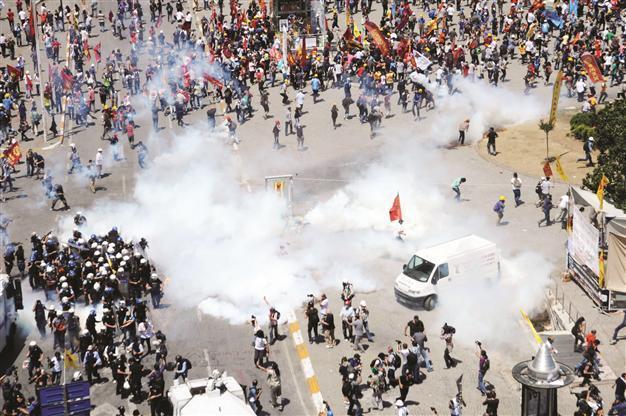Freedom and rights in Turkey declining, US think tank says
ISTANBUL - ANKARA

A recent report by the US think tank Freedom House says heavy-handed police crackdowns on Gezi Park protests areconflicting with the freedoms of association and assembly, which are protected in the Turkish Constitution.
Turkey is declining in terms of freedoms and rights, according to the annual report from U.S. think tank Freedom House. The report made particular reference to the harsh police crackdown on protesters during the nationwide Gezi Park protests and the increase in political pressure exerted by the ruling Justice and Development Party (AKP).This year’s “Freedom in the World” report ranks Turkey among the “partly free” countries with a rating of 3.5 out of 7, placing it in the same category as countries such as Libya, Pakistan, Mexico, Ukraine and Indonesia.
The report noted a visible deterioration in associational and organizational rights and the exercise of individual rights, particularly due to the government’s response to this year’s unprecedented mass demonstrations.
Criticism on police crackdowns
“Freedoms of association and assembly are protected in the Constitution, and Turkey has an active civil society. However, the police have forcibly broken up public gatherings, with the government justifying its actions by citing the need to maintain order and alleging the presence of violent hooligans and radical groups among the protesters,” the report said. It emphasized that not only the Gezi demonstrations but almost every mass protest met with brutal police methods throughout 2013.
The report also voiced concerns about the reports of ill-treatment that emerged last year. “During the Gezi protests, the media and human rights groups documented harsh beatings, threats of and actual sexual assault by police, and widespread use of unofficial detention,” it said.
Meanwhile, the U.S. think tank gave a positive assessment of the Kurdish peace process launched by the government over a year ago. The cease-fire declared by the Kurdistan Workers’ Party (PKK) in March has improved the security situation in the country, the report said, also adding that a “democratization package” announced late September had given further rights to Kurds.
“Many past restrictions on the Kurdish language have been lifted, and as a result of the September 2013 democratization package, Kurdish-language education in private schools is now allowed, Kurdish names have been restored to several villages and provinces, and a mandatory pledge by schoolchildren that affirms their Turkishness and was viewed as offensive by many Kurds is no longer conducted,” it said, while adding that the implementation of the proposals were still to be seen.
The report also noted that measures towards Alevis, such as the recognition of Cemevis as official places of worship, were omitted in the same package. “The Alevis, a non-Sunni Muslim group, lack protected status,” it said.
It noted with concern the pressure being exerted on media outlets, judges, scholars and business groups that are critical of the government or have displeased the ruling AKP.
Corruption was referred as a “major problem in Turkey” in the light of the massive graft probes that emerged in December 2013. “There is also concern over the awarding of government contracts, as major projects have allegedly benefited AKP party officials and the armed forces,” the report also said.
Former envoys: US needs to tell Turkey to change ways
Former U.S. ambassadors to Turkey, Morton Abramowitz and Eric Edelman, called on the U.S. policymakers to urge Turkey about the importance of political stability and democracy, in their joint Washington Post column.
“U.S. policymakers should lay aside their reluctance to confront the disastrous impact of [Turkey Prime Minister Recep Tayyip] Erdoğan’s dictatorial tendencies and remind the Turkish leader of the importance the United States attaches to Turkey’s political stability and democratic vitality.
Particularly as their influence is greater than it appears: While Turks do not trust the United States, neither do they like to be at odds with it.”
The two former ambassadors accused Erdoğan of “exploiting” Turkey’s partnership with the U.S. and his close personal relationship with President Obama to “burnish his legitimacy.” “U.S.
condemnation of his recent actions — publicly and even more strongly in private — might temper his posturing. However significant U.S. interests with Turkey are, neither silence nor platitudes will help halt its political descent,” they wrote in their joint column.
They also claimed Erdoğan is doing “great harm to Turkey’s democracy.”
















